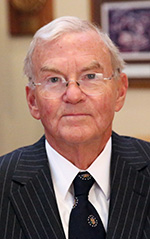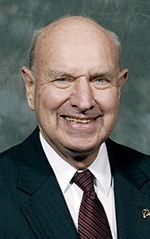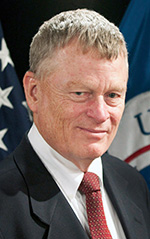Revitalizing State—Closing the Education Gap
To reclaim leadership in handling international problems, State must increase investment in professional development of its greatest asset: its people.
BY DAVID C. MILLER JR., THOMAS R. PICKERING AND RAND BEERS

istockphoto.com / RawPixel
In a nation in need of strong, clear leadership in a broad range of domestic areas, the Biden administration will also face profound foreign policy and national security challenges. Tensions with China will only grow, played out in many regions where Beijing is aggressively asserting itself diplomatically with soft power. Russia will continue its disruptive actions along its border and elsewhere. Rebuilding our alliances and re-establishing international organizations will be a priority. COVID-19, a declining economy and human rights cover concerns both at home and abroad.
The State Department must reclaim a leadership role in handling international problems. Yet any rebuilding effort will fall flat if it does not include a significantly increased investment in the professional development of the department’s greatest asset: its people.
We arrive at this conclusion having spent decades serving in or working closely with the State Department. Education and training, other than for languages, have long been under-resourced and seldom a leadership priority, but must be an integral part of the effort to revive American diplomacy, prosperity and leadership.
Our nation needs the State Department to continue to excel. The issues require well-trained diplomats and smart diplomacy. Science and technology, disease and health, arms control and nonproliferation, climate change and the global economy present newer challenges, along with the enduring issues of development, drugs, crime, corruption, migration, ethnic tension and terrorism. These are but some examples where specific professional education is not just useful but essential.
We have for too long fallen back on the U.S. military to deal with our critical international challenges, but the military is not recruited and prepared for, or expert in, integrated power solutions, and it is downsizing in recent conflict zones. This puts the State Department, more than ever, in the front line of security and stability as “the tip of the spear.” This, in turn, requires a department fully prepared to step into the role. It offers an opportunity for State to learn from the past, look to the future in resetting priorities and, importantly, expand and enhance training and education for its workforce in its changing, varied and critical missions.
Professional Development at State
Instead of investing sufficiently in formal education and training, the State Department has relied heavily on a kind of “apprenticeship training” in which observation and experience is the model. Its Foreign Service and Civil Service officers are often left to learn primarily through “on-the-job training.” While experience is a necessary ingredient in professional development, it can be hit or miss, especially when not linked to a formal, continuous education process. Indeed, because learning through experience will always be available, the time has come to make the best use of it. And that requires professional education that moves beyond simply teaching for the next job and instead creates a framework of knowledge and skills through which to evaluate experience and enhance career development.
While active mentorship by more senior personnel is presumed to teach and refine experiential learning into needed skills, it is also the case that mentors themselves are not only pressed for time, but sometimes need more training in what skills to focus on or how to frame a subordinate’s experience for broader departmental objectives. Moreover, officers themselves are constantly jumping from one issue to another. They are often challenged to find the time to reflect on lessons learned from experience or to use that reflection for career development to make themselves better able to develop new policies to solve new problems.
The State Department has relied heavily on a kind of “apprenticeship training” in which observation and experience is the model.
The unstructured approach to professional development is inadequate. The lack of leadership support for, and investment in, formal education must change so that classroom learning can pair with and better focus experiential learning and develop better officers over the longer term. State cannot depend on excellence at the time of recruitment as a substitute for continuing professional education. It can no longer rely on on-the-job training or mentoring without strategically planned, expanded, sustained, formal professional education at all levels.
A “business look” at the State Department is revealing. The department has some physical assets—headquarters, embassies and other structures—but its heart is its people. People produce its product. Our diplomats represent the United States and its values to the world. Any firm ignoring its main asset, starving its diverse workforce of learning, time and resources, soon ends up on the rocks. Professional education needs to provide its members, all its members, with what they need to know and teach them how to use it effectively. Most of all, it needs to teach them how to confront new and constantly changing situations, employing foresight and innovation to avoid purely reactive approaches.
The State Department can benefit from how other federal departments and agencies approach education. While their missions and the content of their training are different, the Federal Bureau of Investigation, Central Intelligence Agency, Defense Department and others invest more time and resources in formal professional education. The U.S. military treats education and training as absolutely central to its missions; personnel spend 15 to 20 percent of their time in formal professional development. By contrast, with the exception of foreign language instruction, formal State Department education and training lack sufficient participation by our diplomats to enable them to reach their full potential for operating in today’s complicated security environment.
State Department personnel are exceptionally capable and committed individuals, many of whom make great sacrifices to serve our nation. While the Foreign Service Institute is committed to providing the best education possible within its existing operating budget, our foreign policy professionals deserve and need a commitment to more extensive professional development.
Confronting the Budget Problem
Diplomatic Studies Foundation: Who We Are, What We Do
The U.S. Diplomatic Studies Foundation, formally established in 2017, provides financial and intellectual support to the Foreign Service Institute for the development and implementation of innovative education and training. The foundation’s goal is to work with the State Department to develop officers of excellence to support the diplomatic objectives of the country through lifelong learning and continuous innovation in both instructional technique and focus of instruction.
The foundation is supported entirely by private contributions from individuals and major foundations. It operates under a memorandum of understanding (MOU) signed with FSI in February 2019 and recently extended to February 2022. The MOU provides the framework for FSI to adopt improvements to existing courses and explore new educational opportunities, with the shared goal of the foundation and FSI to transition those experiments to public funding if and as they prove successful.
DSF has engaged recently retired ambassadors to enhance area studies training with practitioners, and is also bringing together senior State Department and congressional professionals in a seminar to inform and improve contacts with each other. The foundation is exploring training to help diplomats work better with American businesses to promote U.S. commercial interests overseas. DSF is also promoting a new concept of tabletop simulations called “Peace Games” to augment classroom teaching, drawing on the military’s widely developed war-gaming experience.
To approach an acceptable level of professional development, leadership must prioritize education and training as it deals with the lack of budgetary support it receives from Congress. For years the State Department has blamed budget constraints, together with higher priorities, for not investing more in education and training and for ignoring internal and external reform proposals. While funding levels for the department are certainly an issue, especially now for the new administration, without a top-level commitment to education, that funding will continue to be underprioritized and underresourced by Congress. Recent studies have estimated that the State Department needs a 2,000-person increase in staffing to avoid having to take personnel out of operational work for enhanced professional education. This requires a related leadership commitment, as well.
The harsh reality is that it will be difficult to increase the State Department budget substantially over the next several years as our nation faces huge budget deficits and critical domestic needs coming out of the COVID-19 pandemic and the resultant economic downturn. This will require weighing the education and training investment in human capital, the department’s most important asset, against other priorities. Is every item of State’s planned construction more urgent at this time than educating its personnel? Can the State travel budget be a source of savings for education using the COVID-19 experience to show the efficacy of virtual meetings? Similarly, FSI has done a remarkable job of transitioning nearly all its training to the virtual world. Can the efficiencies created through virtual instruction be leveraged to allow the department to do more with existing resources?
Without also challenging business-as-usual budgets, the department will continue to short the professional development of its people. On a broader government level, however, the State Department budget does not occur in a vacuum. Former Defense Secretary James Mattis once famously said: “If you don’t fund the State Department fully, then I need to buy more ammunition.” What if that statement could be turned on its head?
We are optimistic that the Biden administration, working closely with Congress, will rise to the challenge and exhibit the commitment to prioritize and then fund upgraded State Department education and training.
Five Steps to Consider
Here are some basic steps deserving of consideration from the perspective of the U.S. Diplomatic Studies Foundation.
Give high priority to a comprehensive review of the careerlong progression of tradecraft and general skills that all employees need, linked to a thorough needs assessment. Begin planning now for a full set of revised courses at the entry-, mid- and senior levels for the longer-term future. This revision should be based on existing studies of needs and any necessary new research to provide officers and staffs, the Congress and the public with the best overall solution to this issue. Assessments should also prepare a way to acquire all the needed authorities and funding.
Prepare ambassadors for their expansive and critically important mandate. The president traditionally writes a general instruction letter to new ambassadors and places an incredible amount of responsibility and accountability in the hands of the chief of mission. This includes broad oversight of all U.S activities in a host country (excluding military-commanded combat activities). While career Foreign Service ambassadors have a wealth of prior foreign policy experience both at home and abroad, these men and women only receive roughly three weeks of ambassadorial training before representing the United States across the entire range of international activity of the U.S. government in their host country.
The current course simply does not allow enough time for thorough coverage of the scope of ambassadorial responsibility and, more generally, the criticality of that role. Moreover, greater provision needs to be made for noncareer appointees, brand-new to the task, who need a more in-depth orientation. But any course of this nature on the eve of becoming an ambassador or, for that matter, an assistant secretary is going to be too little, too late, if it is not built on a solid professional education as well as experience.
The unstructured approach to professional development is inadequate.
Increase the quality and quantity of midlevel training. There is a significant gap in essential training at the midlevel. The midlevel is also where the department begins identifying potential seniors and seeing higher frequency in the departure of minority employees. This is where the department can make the biggest statement about its commitment to the career development of its personnel.
By programming more training opportunities for employees and ensuring availability for attendance, the department can directly and forcefully affirm its commitment to the professional development of all its officers. It has for decades provided a widely successful course in upgrading economic proficiency. In the last 20 years, it has added a careerlong progression of courses in leadership and management. Those courses need complements in other areas—e.g., where newly arising knowledge and skills are required such as in technology and climate generally, and cyber security particularly.
Increase the frequency of training, and tie training to promotion. Although the percentage of State Department officers’ time spent in training may not realistically equal their military counterpart’s (15 to 20 percent), State should, with the exception of language training, approach levels similar to the more parallel CIA (about 5 percent). The department must supplant the current culture that sees training as career-stalling with a new culture of education being career-enhancing by making certain courses, and a student’s performance in them, a requirement for promotion.
Provide initial, joint residential training for new officers. A residential training experience on entry into the Foreign and Civil Service allows officers to build camaraderie and a unified State Department identity. Joint residential training can also help build needed personnel cohesion within the department, overcoming the culture gap that exists between the Foreign Service and Civil Service.
Improved education and training reform is not “Mission Impossible.” There is an emerging broad coalition of retired and currently serving senior State Department officials and congressional leaders that will support meaningful education and training. A number of recent studies are available; the recommendations are similar, and the agenda is clear. The Diplomatic Studies Foundation is prepared to help start and initially fund some of this effort.
Getting it done, giving the women and men who serve the State Department the intellectual software they need to best serve our nation, will require breaking some china and taking some heat. The State Department and the nation it serves deserve no less than that commitment from the new Secretary of State and administration.
Read More...
- “It’s Practical: Training the Next Generation of Diplomats,” by Edward “Skip” Gnehm, The Foreign Service Journal, September 2017
- “The Making of an Effective Diplomat: A Global View,” by Robert Hutchings and Jeremi Suri, The Foreign Service Journal, December 2017
- FSJ Special Collection on Diplomatic Tradecraft







